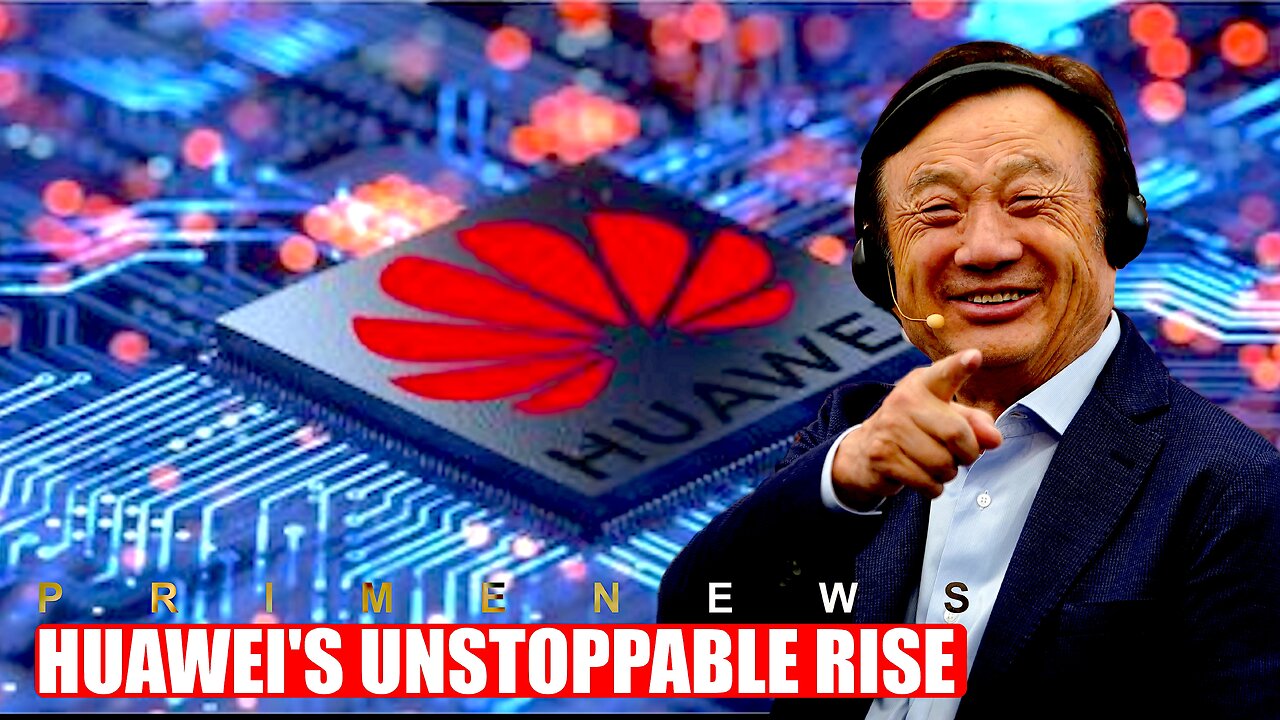Premium Only Content

Huawei's Unstoppable Rise
Huawei's Unstoppable Rise: China's Transformation into the World's Chip Powerhouse
In recent years, Huawei, the Chinese telecommunications giant, has undergone a transformation behind closed doors, establishing itself as a prominent player in the global semiconductor industry. China's ambitious efforts to develop advanced microchips have culminated in a secretive project aimed at making Huawei the leader in chip manufacturing, surpassing industry juggernauts like Intel and Samsung.
The covert project involves China's state-sponsored research institutions, leading Chinese engineers, and substantial investments from the government. Its primary goal is to develop and produce cutting-edge semiconductor chips that can power the next generation of technology, such as 5G networks, artificial intelligence (AI), and autonomous vehicles.
Undoubtedly, the project solidifies China's long-term vision of achieving technological self-sufficiency and reducing its dependence on foreign chip manufacturers. By transforming Huawei into a powerhouse of chip production, China aims to unshackle itself from potential supply chain disruptions caused by geopolitical tensions or trade disputes.
The process leading to Huawei's transformation into a powerful chip manufacturer involves multiple stages. First, China has been aggressively recruiting top-tier talent from around the world, enticing renowned chip experts with lucrative compensation packages and unparalleled resources. These experts, along with China's skilled engineers, work diligently in state-of-the-art research facilities, pushing the boundaries of chip design and manufacturing capabilities.
Additionally, significant investments have been injected into research and development (R&D) efforts, enabling Huawei to acquire the latest equipment and cutting-edge technologies necessary to stay at the forefront of the semiconductor industry. The Chinese government's support includes grants, subsidies, and partnerships with educational institutions, fostering a conducive environment for innovation and advancement.
Moreover, Huawei's partnership with Chinese chip fabs, such as Semiconductor Manufacturing International Corporation (SMIC) and Tianjin-based Naura Microelectronics, has facilitated the localization of chip production, reducing reliance on foreign companies. These fabs have been upgraded with state-of-the-art equipment and processes, enabling them to compete with established industry leaders. Together, Huawei and its chip fabs are poised to challenge the status quo and disrupt the global chip industry hierarchy.
Of particular significance is Huawei's focus on the development of advanced chip architectures, optimized for specific applications. This strategic approach allows Huawei to create chips tailored to particular sectors, leading to significant performance improvements and energy efficiencies. By specializing in areas such as AI, 5G networking, and cloud computing, Huawei's chips gain a competitive edge, attracting interest from domestic and international customers alike.
The transformation of Huawei into the most powerful chip manufacturer in China is a carefully orchestrated endeavor that aligns with the country's broader technological ambitions. By investing heavily in R&D, talent acquisition, and state-of-the-art manufacturing capabilities, China is positioning Huawei to become a dominant force in the global semiconductor arena.
However, the journey to chip-making supremacy is not without challenges. The microchip industry is highly complex, competitive, and subject to strict international regulations. Furthermore, Huawei faces intense scrutiny from foreign governments concerned about potential security threats arising from its involvement in critical infrastructure projects. These obstacles necessitate meticulous planning, continuous innovation, and enhanced transparency to build trust with international partners and customers.
In conclusion, China's secret transformation of Huawei into the most powerful chip manufacturer is a reflection of the country's determination to achieve technological self-sufficiency. By combining vast resources, top-tier talent, and substantial investments, China is positioning itself to disrupt the global chip industry and reduce its dependence on foreign suppliers. Huawei's rise as a prominent chip manufacturer is not only a testament to China's relentless pursuit of technological advancement but also a catalyst for a new era of innovation and competition in the semiconductor space.
-
 5:01:11
5:01:11
FreshandFit
6 hours agoJoe Budden Arrested For Being A Perv! Tesla Cybertruck Explosion
67.9K10 -
 2:08:45
2:08:45
Kim Iversen
9 hours agoNew Year, New PSYOP?: The Fort Bragg Connection In The New Years Terror Attacks
61.9K112 -
 1:41:18
1:41:18
Glenn Greenwald
9 hours agoTerror Attacks Exploited To Push Unrelated Narratives; Facing Imminent Firing Squad, Liz Cheney Awarded Presidential Medal | SYSTEM UPDATE #381
90.2K169 -
 1:00:32
1:00:32
Man in America
10 hours ago🔴 LIVE: Terror Attacks or False Flags? IT DOESN'T ADD UP!!!
47.6K15 -
 1:02:38
1:02:38
Donald Trump Jr.
12 hours agoNew Year’s Terror, Latest Breaking News with Sebastian Gorka | TRIGGERED Ep.204
194K388 -
 59:59
59:59
The StoneZONE with Roger Stone
7 hours agoAfter Years of Targeting Trump, FBI and DOJ are Unprepared to Stop Terror Attacks | The StoneZONE
60.7K17 -
 1:26:42
1:26:42
Leonardaisfunny
6 hours ago $3.85 earnedH-1b Visas: Infinity Indians
39.1K18 -
 1:08:33
1:08:33
Josh Pate's College Football Show
11 hours ago $2.41 earnedPlayoff Reaction Special: Ohio State Owns Oregon | Texas Survives | UGA vs Notre Dame Takeaways
33.9K6 -
 58:04
58:04
Kimberly Guilfoyle
10 hours agoFBI's Terror Response Failures, Live with Steve Friend & Kyle Seraphin | Ep. 185
110K44 -
 2:15:01
2:15:01
WeAreChange
11 hours agoMassive Developments In Vegas Investigation! UNREAL DETONATION, Shocking Details Emerge!
115K45